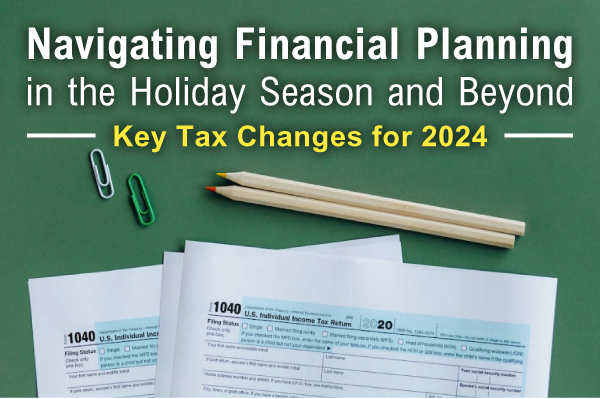
With the Christmas/holiday season upon us, we are all thinking about giving cheer, spending time with family, and the things that are important to us. We will go to parties, spend time with friends and loved ones and give thanks in many ways. One of the greatest gifts we can give to our family (and ourselves) is financial security. There are many things that often get pushed to the wayside as we do this thing called life. Remember, it’s important to take the time to enjoy all this wonderful season has to offer, but make sure that you are setting a plan to address these important issues, either now or in the new year.
Start by setting a date on your calendar when you will start planning the steps necessary to accomplish your financial goals. Research shows that when you put specific dates on your calendar for steps you need to accomplish, you are much more likely to meet those goals. Similarly, if you break your goals down into smaller steps, you will find it easier to accomplish each task and will be less likely to feel overwhelmed and give up.
Furthermore, telling others what your goals are helps you build accountability partners who will help you stick to the task. Finally, make sure you get the expertise you need to make it to the finish line.
With the new year comes updates to important guidelines that you need to be aware of when planning. You don’t want to follow the status quo, but rather adjust with the changes. With that in mind, you need to know that the IRS has recently released important changes to the numbers that govern our investment and savings. I’ll share the key changes with you.
Tax Bracket Adjustments for Inflation
Due to inflation, the IRS has adjusted the tax brackets for 2024 by about 5.4%. This means you can earn about 5.4% more in 2024 and not pay more taxes.
Standard Deduction
The standard deduction will be increased to $14,600 for single taxpayers and $29,200 for married filing jointly. This is an increase of $750 and $1,500, respectively. Currently about 11% of Americans use itemized deductions and this standard deduction increase helps more people to reduce their taxable income again in 2024.
Retirement Accounts
Workplace retirement accounts like 401(k), 403(b) and 457 plans will see an increase of $500 to the maximum contribution you can make for the new year. American workers can now contribute $23,000 to these accounts, up from $22,500 in 2023. This gives you an opportunity to save more money for retirement. If you are age 50 or older by Dec. 31, 2024, you will be able to contribute an additional $7,500 as a “catch-up contribution.” This allows you to save more money as you get closer to retirement.
Individual Retirement Accounts (IRAs) will also see an increase in the maximum annual contribution, from $500 to $7,000. If you will be age 50 or older in 2024 you can contribute another $1,000 for a total of $8,000.
With Roth IRAs, there is a maximum amount you can earn in a particular year in order to qualify, a limit put in place to prevent wealthier Americans from taking the tax benefit (at least not directly). The income phase-out range for Roth IRA contributions increased to the range of $146,000 to $161,000 for single filers and heads of household. For married couples filing jointly, phase-out will be $230,000 to $240,000 (a $12,000 increase). This means that when you hit those levels your ability to contribute to a Roth gets phased out to $0 as you climb to the top of the range.
Gift Tax
The annual gift tax exclusion is now $18,000 for 2024, an increase of $1,000 from the previous year. Unlike most taxes, where the person receiving the money pays a tax, the tax is on the giver when it comes to gifts. The tax calculation itself is a bit complicated, but the idea here is that if you give $18,000 or less to anyone you know, you will not limit your estate tax contribution. If you are married, you and your spouse can each give $18,000 to those you would like to make gifts to with no tax consequences.
While this article cannot cover all the changes, these are the ones that will impact most people. If you would like to receive a complimentary guide for all the items that you need to consider, feel free to reach out and I’d be happy to share it with you, no strings attached.
(Disclaimer: The information provided herein is not tax, legal or financial advice. It is for informational purposes only. These numbers are provided to you based on current information released by the IRS and could be subject to change. Be sure to set up time to speak with your financial advisor and CPA to learn more about how these changes will impact you.)













